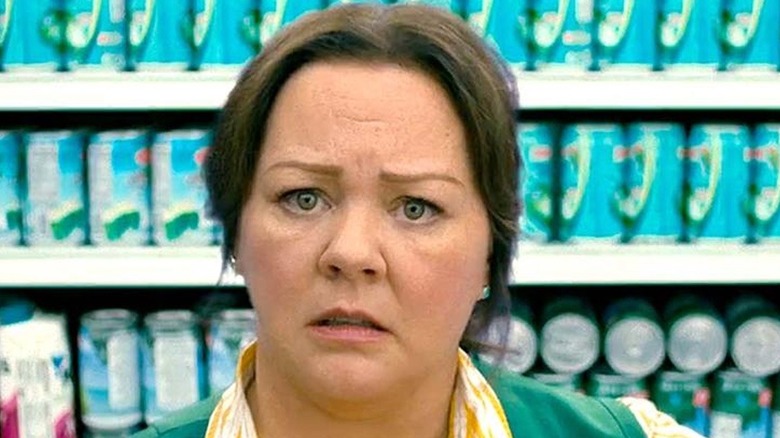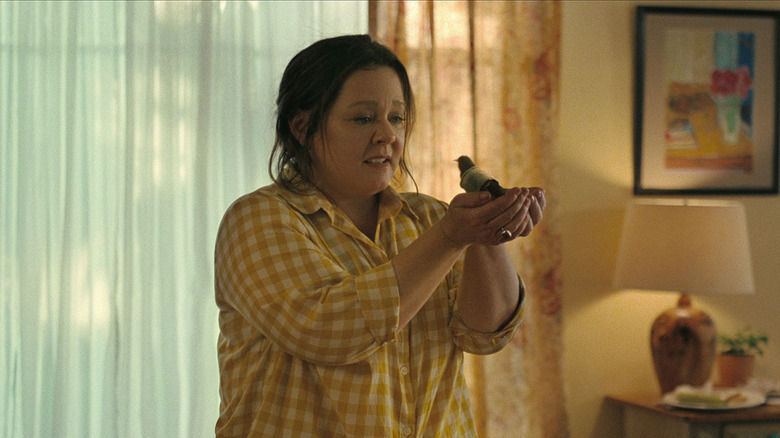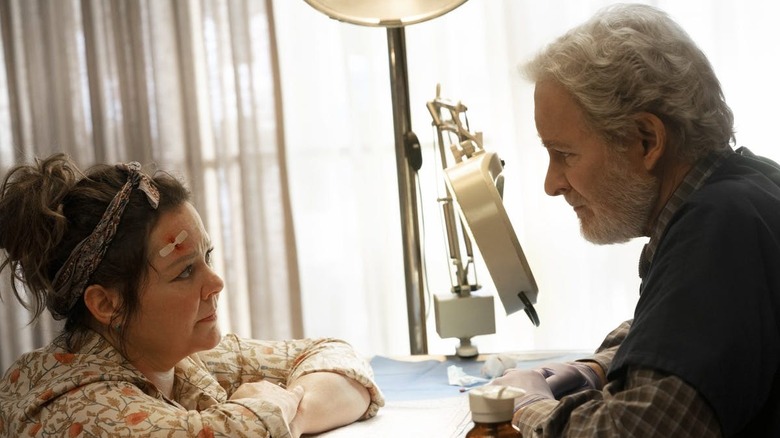TIFF Movie Review: The Starling
People experience grief in different ways, making it almost impossible to state that a movie doesn't ring true in its portrayal of people facing up to the loss of a loved one. Claiming that an actor's behavior or specific decisions in regards to characterization feel false is a slippery slope towards policing the ways in which real people grieve — suggesting that if they don't fall into an easily recognizable pit of sadness, they're a bad person, with quasi-sociopathic tendencies. It takes a monumentally misjudged film to put these feelings to one side, but one has arrived in the shape of "The Starling," which premiered at the Toronto International Film Festival prior to its debut on Netflix.
Inside the film from Theodore Melfi, the director's long awaited follow-up to the crowd pleasing "Hidden Figures," there is a well-observed drama about the emotional strains losing a child can force upon a relationship and an individual. Unfortunately, any heartfelt observations the film has are buried under layers of endless quirk, this storyline taking a back seat to a pratfall-heavy slapstick comedy in which Melissa McCarthy goes to war with a bird that's becoming increasingly territorial in her garden. As the actress keeps going head to head with the fakest-looking CGI bird you've ever seen in your life, whatever promise the rest of the film has is squandered. It feels like a Frankenstein's Monster of two separate screenplays forcibly stitched together, working only to the detriment of both — the most tonally jarring film I've had the misfortune of sitting through in quite some time.
A distasteful inspirational drama
McCarthy and Chris O'Dowd star as Lilly and Jack Maynard, a married couple we're introduced to shortly after the birth of their child, cutting forward a year to reveal that their lives have fallen apart in the interim. Their daughter has died, the reasons for which are never disclosed, and Jack has been committed to a psychiatric facility following a suicide attempt. Lilly's reaction has been altogether different — she still goes to her grocery store job (where her manager is played by a bafflingly underused Timothy Olyphant), but it's clear that everything is still far from fine. She's distant and distracted, but insistent on everything being normal, even though she and Jack haven't yet sat down to discuss what has happened.
At a group therapy session at Jack's facility, it's recommended that Lilly go speak to a therapist, and she's given the contact information for Dr. Larry Fine, played by Kevin Kline. So she goes to his office and discovers that he quit the psychiatry business ten years ago to retrain as a vet, but he still opts to see her anyway. (You may be wondering why she's getting therapy sessions from a guy who primarily tends to sick animals, but boy oh boy, is there a narrative contrivance waiting just to explain it.) Lilly is currently in the process of clearing out the house to move on from the death of her daughter, but finds herself getting attacked by a bird every time she goes to the garden. Naturally, she enlists the help of a vet in order to plan her retaliation. Why couldn't the Kevin Kline character just be a therapist with an interest in birdwatching, I hear you ask, especially when the movie makes a direct joke about the lack of explanation as to why he left one industry to retrain as a vet? Like so much in "The Starling," entire characterizations are ill thought through and ring distractingly false.
The film's central emotional drama isn't just undercut by a subplot in which Melissa McCarthy repeatedly gets attacked by a bird, but by its lack of understanding for the lingering effects of grief. We are told that the film takes place a year following the death of their daughter, which is seldom discussed or explored, and feels distastefully like a cheap plot point for the characters to overcome. In its worst moments, "The Starling" takes on the guise of an inspirational drama, viewing tragedy not as something that stays with you, but an obstacle to overcome. The fact the story cuts forward a year, rather than dealing directly with how the couple faces up to the news, goes a long way to explaining its approach to grief. It's not something the film has any interest in grappling with, existing only as a plot point and nothing more.
A film out of time
One thing of note that immediately jumps out while watching Melfi's film is that this story could have taken place at any point in the last 40 years. This is a world seemingly without technology, with no phones or devices glimpsed, and its rustic setting seemingly a thousand miles away from the nearest city. The folk-heavy soundtrack, featuring original songs by the Lumineers, only furthers this strange out-of-time quality. The reason for this is simple: the screenplay for "The Starling" has been gathering dust on a shelf since 2005, when it made the inaugural Black List of best unproduced screenplays, gathering dust while other titles ranging from "Juno" to "Blades of Glory" were quickly picked up and fast-tracked. All these years later, and it's still the first screenplay from writer Matt Harris to have been made — in the years since writing "The Starling," his only credits have been executive producing shows like "TruTV Top Funniest," a clip show that predominantly focused on videos of people getting injured. Perhaps his penchant for writing badly timed slapstick into his "Starling" screenplay is what led him to that gig.
If there is a bright spot within this dismal film, certainly one of the year's worst, then it's Melissa McCarthy. Very few films showcase the best and worst of an actor's attributes in the way this one does, with painfully unfunny pratfall comedy sitting next to sequences in which she displays her impressive emotional range, and ability to sell a brash character's most introspective moments. She certainly outshines the rest of the ensemble; O'Dowd is the performer most clearly struggling with the jarring tonal disparity, while Kline's affable deadpan humor works for neither register the film is going for.
It doesn't take long to realize exactly why "The Starling" has spent nearly 20 years going unmade. The only mystery is what any Hollywood producer saw in such a bizarrely misjudged project in the first place.


